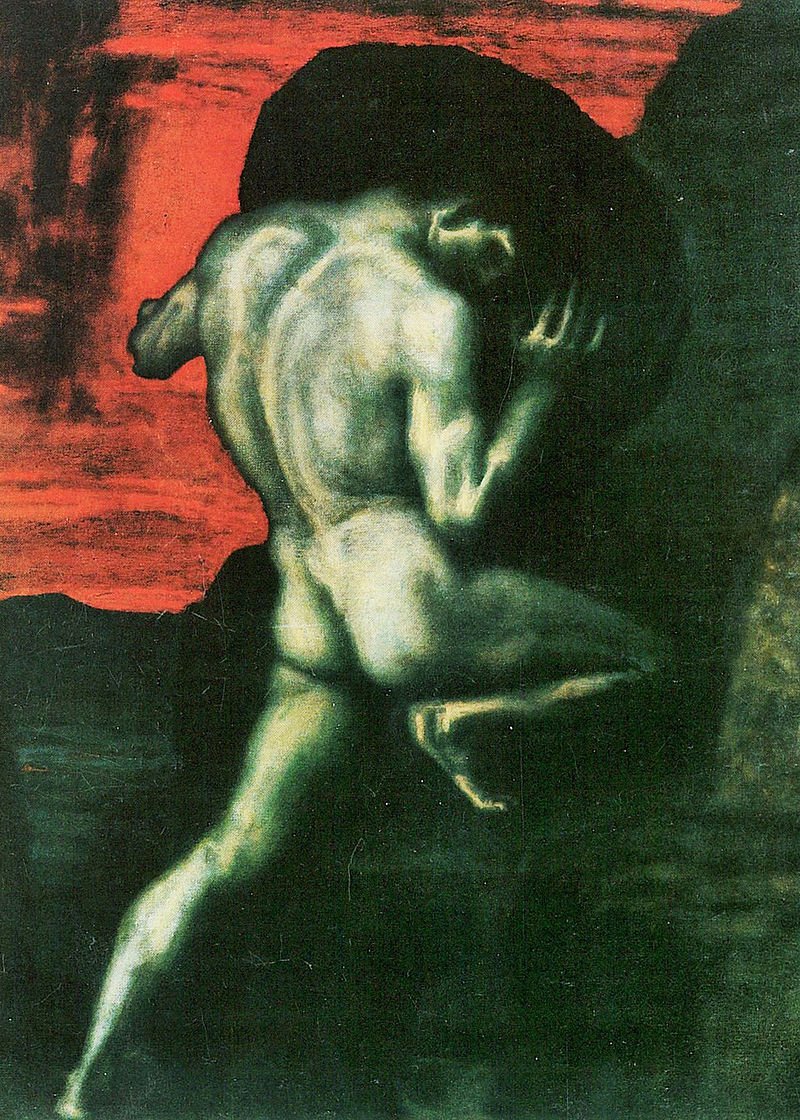Sisyphus, the Eternal Trickster
“Sisyphus – The Mythical Figure Who Defied the Gods and Changed History Forever!”

Sisyphus is a king that was punished in the underworld after he upset the gods with his extraordinary cunning. He was sentenced to be blinded and to perpetually roll a giant boulder up a mountain to the peak, only to have it inevitably roll back down the mountain into the valley.
- Alias: None
- Gender: Male
- Race: Human
- Occupation: Former King and Trickster
- Religion: Ancient Greek Pantheon
- Allies: Often worked alone, though he had allies and acquaintances among both gods and mortals
- Enemies: The gods of Mount Olympus, especially Zeus
- Abode/Base of Operations: Initially Corinth, Greece, and later the Underworld
- Nationality: Greek
- Languages: Ancient Greek
- Alignment: Chaotic Neutral
- Affiliation(s): None
- Significant Others: Wife – Merope, with whom he had several children
Sisyphus, a figure from ancient Greek mythology, is a character shrouded in a timeless tale of resilience and defiance. He finds himself caught in a never-ending cycle of challenge and perseverance. Sisyphus is a man driven by an unwavering spirit and the pursuit of personal freedom. Though condemned by the gods, his determination knows no bounds as he navigates a life marked by deception, cunning, and a deep desire for autonomy.
As a character, Sisyphus fears the shackles of fate and the oppressive grasp of the divine. His unyielding determination stems from a profound yearning for independence and self-determination. Sisyphus is a symbol of human tenacity in the face of adversity, as he continues to defy the gods’ decree, intent on achieving freedom from the endless toil and the burden of his actions. His story serves as an enduring testament to the human spirit’s resilience and the unrelenting pursuit of individuality.
Sisyphus

Medium humanoid (trickster), neutral
Armor Class 15 (leather armor) Hit Points 99 (18d8 + 18) Speed 30 ft.
| STR | DEX | CON | INT | WIS | CHA |
|---|---|---|---|---|---|
| 10 (+0) | 18 (+4) | 12 (+1) | 16 (+3) | 16 (+3) | 16 (+3) |
Skills Acrobatics +7, Deception +7, Insight +7, Sleight of Hand +7, Persuasion +7 Senses Darkvision 60 ft., Passive Perception 13 Languages Common, Abyssal (understands but cannot speak) Challenge 6 (2,300 XP)
Background: King of Tricksters. Sisyphus was once a cunning king who defied the gods. As punishment, he was condemned to an eternity of futile labor, rolling a massive boulder uphill, only to have it roll back down. Despite his tragic fate, he remains determined and resourceful, using his trickster skills to his advantage.
Eternal Labor. He is under a perpetual curse. Whenever he uses his bonus action, he can begin pushing a boulder. The boulder moves at a speed of 5 feet per turn. Sisyphus can take other actions or reactions while pushing the boulder, but if he is incapacitated, the boulder stops. If the boulder reaches a slope or incline, it rolls back to its original position.
Rolling Despair. When he completes his task of pushing the boulder to the top of a hill, he can make a ranged attack to shove it down the hill. The boulder rolls downhill, dealing 6d8 bludgeoning damage to any creature in its path. Sisyphus can use this ability once, after which he must restart his eternal labor. The boulder can be destroyed (AC 15, HP 50) to prevent further use of this ability.
Cunning Trickster. He has advantage on saving throws against being frightened and exhaustion. He is also proficient in Deception and can create minor illusions, providing disadvantage to attacks targeting him or allies.
Actions
Multiattack. Sisyphus makes two melee attacks.
Dagger. Melee or Ranged Weapon Attack: +7 to hit, reach 5 ft. or range 20/60 ft., one target. Hit: 6 (1d4 + 4) piercing damage.
Relentless Grasp. Sisyphus grapples a target within 5 feet. The target must succeed on a DC 14 Strength saving throw or be restrained. Sisyphus cannot use this ability while pushing the boulder.
Eternal Deception (Recharge 5-6). Sisyphus creates an illusion of a mirror image. He can use this ability when targeted by an attack or ability. The attacker must make an Intelligence saving throw (DC 14). On a failure, the attack targets one of the illusionary duplicates. If the attacker succeeds or the duplicate is hit, it vanishes. Sisyphus can use this ability once, recharging on a 5 or 6 on a d6 roll.
Reactions
Indomitable Will. When he fails a saving throw, he can choose to succeed instead. He can use this ability once per long rest.
Evasion. When he is subjected to an effect that allows him to make a Dexterity saving throw to take half damage, he instead takes no damage on a successful save.
Equipment
Sisyphus carries a masterwork dagger, wears leather armor, and always carries a bag of tricks filled with illusions and distractions.
Currently in the World
Sisyphus appears as a tall and wiry man, his appearance weathered by eons of toil. He is dressed in tattered, earth-toned rags that hang loosely from his frame. The colors of his clothing have faded over the centuries, reflecting the countless days he’s spent pushing the boulder. His skin, once olive-toned, is now a shade of pale gray, marked with scars and scratches from the ceaseless labor.
He is currently engaged in his eternal punishment, pushing an enormous boulder up a steep hill in the Underworld. Beads of sweat glisten on his furrowed brow as he strains against the weight of the stone. His surroundings are desolate, with jagged rocks and barren landscapes stretching as far as the eye can see. The air is heavy with an oppressive silence, broken only by the grunts of effort and the relentless sound of the boulder scraping against the ground.
His mood is one of eternal frustration and futility. Sisyphus is trapped in an unending cycle of pushing the boulder up the hill, only to watch it roll back down when he nears the summit. Despite his constant struggle, he never gives in to despair, and there’s a stubborn determination in his eyes, a spark that refuses to be extinguished by his punishment.
In Myth
Sisyphus was the father of Odysseus by Anticlea, just before she married her later husband, Laertes.
Sisyphus promoted trade and commerce, but is avaricious and deceitful by killing travellers and guests in violation of the laws of hospitality. Sisyphus was famed as the craftiest of men. He seduced his niece, took his brother’s throne and betrayed Zeus’s secrets (specifically, Zeus’ rape of Aegina, the river god Asopus’ daughter; by some accounts, the daughter of his father Aeolus, making her either Sisyphus’ sister or half-sister).
Zeus then ordered Hades to chain Sisyphus in Tartarus. Sisyphus slyly asked Thanatos to try the chains to show how they worked. When Thanatos did so, Sisyphus secured them and threatened Hades. This caused an uproar, and no human could die until Ares (who was annoyed that his battles had lost their fun because his opponents would not die) intervened, freeing Thanatos and sending Sisyphus to Tartarus.
However, before Sisyphus died, he had told his wife that when he was dead she was not to offer the usual sacrifice. In the underworld he complained that his wife was neglecting him and persuaded Persephone, Queen of the Underworld that he had been conducted to Tartarus by mistake and she ordered him to be freed. When Sisyphus got back to Corinth, he refused to return and was eventually carried back to the underworld by Hermes.
“Sisyphean task”
As a punishment from the gods for his trickery, Sisyphus was compelled to roll a huge rock up a steep hill, but before he reached the top of the hill, the rock always escaped him and he had to begin again. The maddening nature of the punishment was reserved for him due to the mortal’s hubristic belief that his cleverness surpassed that of Zeus.
Sisyphus took the bold step of reporting one of Zeus’s sexual conquests, telling the river god Asopus of the whereabouts of Asopus’ daughter, Aegina. Zeus had taken her away, and regardless of the impropriety of Zeus’s frequent conquests, Sisyphus unmistakably overstepped his bounds by considering himself a peer of the gods who could rightfully report their indiscretions. As a result, Zeus displayed his own cleverness by binding Sisyphus to an eternity of frustration.

 Buy me a coffee
Buy me a coffee